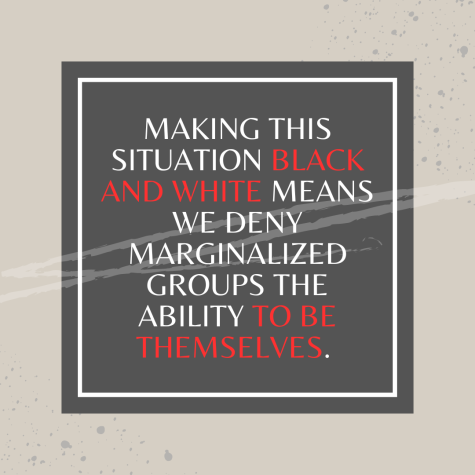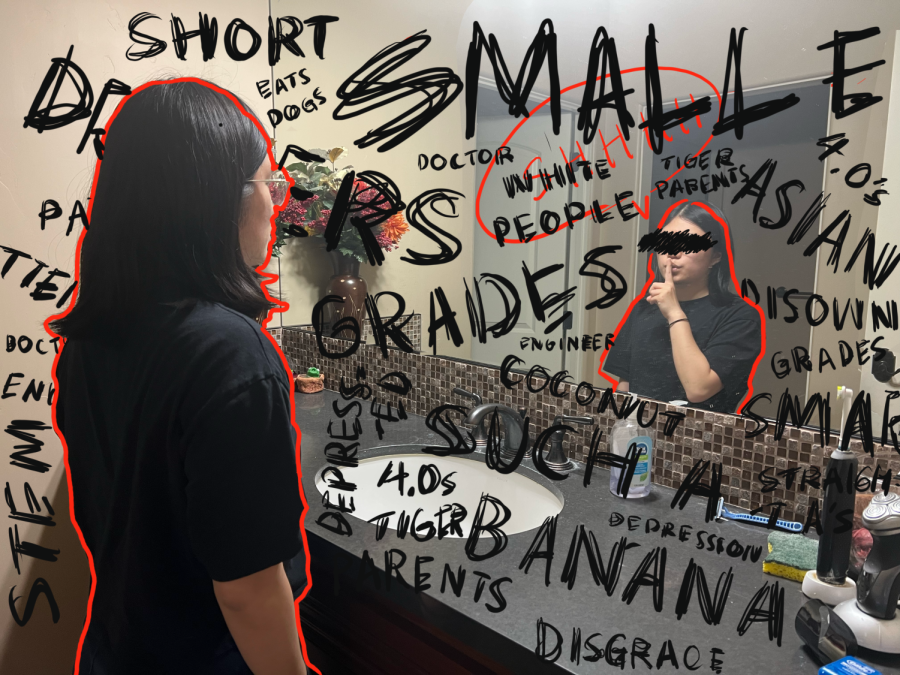Is it a racist joke or just a joke about race?
Exploring the nuances and morals of race jokes
Humor is subjective, and jokes about race are not different – it’s the situational context and understanding of the community that dictate whether they’re appropriate or not.
April 17, 2023
Bro you forgot to turn on the blinker when turning? Man, we [Asians] really are bad drivers.
Imagine wearing shoes in the house white people!
You’re such a coconut – brown on the outside, white on the inside.
Walking around campus, it’s not hard to overhear these jokes about race. Whether it be a playful insult to a friend or laughing at the misfortune of a bad test score, hearing jokes like these aren’t uncommon. Reading them without context may give the impression of racist comments perpetuating common Asian stereotypes, but these comments tend to be made by Asian students themselves, who make up the majority of MVHS’s community. With this information, it becomes a lot more complicated.
There’s a lot of debate surrounding jokes about race, about when it is OK or not OK to make them and who can make them. So at what point does a joke about race become racist? A racist joke often bolsters a negative stereotype against marginalized communities and makes fun of someone or a group of people at the expense of their race. With that in mind, the way American society views race is something that must be taken into account.
It’s important to recognize that institutional racism is a core part of American society. People of color have always been and continue to be discriminated against because of their skin color, and white supremacy has lasted since the beginning of time. The reason it’s not appropriate for white people to make jokes about POC is simple — don’t make fun of a group that is less privileged than yours. But what happens when you’re making fun of the group you belong to? Or even making fun of a group that is more privileged?
For POC, making fun of their own race is not necessarily a racist joke. Jokes from a dominant group “others” the subordinate group. But when POC joke about their own culture or race, it is not “othering.” Of course, there are definitely situations where these jokes might still perpetuate a negative stereotype or reflect internalized racism, but the impact of the statement is much lower compared to if someone from a different race were to say it.
It’s slightly more complex when it comes to POC making fun of white people. In 2018, Sarah Jeong joined the New York editorial board, and was subsequently discovered to have previously tweeted jokes making fun of white people. This prompted waves of backlash, as white people claimed that her tweets were racist. But it isn’t that simple. White people are the dominant group and American society is constructed in a way that actively benefits white people at the expense of putting POC down, otherwise known as white privilege. Putting it simply, white people can’t experience racism. Thus, it’s hard to make a racist joke against a group whose race not only doesn’t invite discrimination, but actively benefits from it. A Black person making a joke about how white people can’t handle spice won’t do anything, but a white person making a joke about how Black people are violent could have much larger consequences.
Think about it this way. If my friends joked about my inability to differentiate between preterite and imperfect verbs, my parents would probably just laugh it off. But if my Spanish teacher were to joke to my parents that I never do my work on time, my parents would probably turn around and flay me alive. And if I were to joke to my parents about how my teacher doesn’t teach at all, and that’s why Google Translate is my best friend, nothing bad would happen to my teacher. Whether I actually was the slacker that constantly uses Google Translate, or I was the person who miraculously gets perfect scores on every test wouldn’t matter: the people who make the joke could completely flip that perception.
It comes with the idea that other groups don’t understand what we go through. The same way Asians will never fully understand the experience of a Black person and white people will never fully understand the experience of someone Hispanic. Even within each group, everyone’s experience will be unique to themselves.

And that’s what it really boils down to: situational context. I wouldn’t make a joke about the Asian psyche to just any Asian person I come across, because that person doesn’t know me. I don’t know what they’ve gone through and they don’t know me as a person. Were I to make that joke to a stranger, it’s possible that it could come across as discriminatory or dismissive of someone else’s experiences because they don’t know whether or not I truly believe that Asians are destined to be STEM gods.
But within a close friend group, where my friends know I don’t think I’m just a short Asian girl whose biggest focus is her schoolwork and is also a terrible driver with small eyes, my friends and I often make jokes like this. For us, making these jokes is something that helps us laugh at something that we might feel anxious or insecure about. It’s similar to how other marginalized groups reclaim certain vocabulary or language.
That being said, whether or not that joke is kind or made in good taste is a different story. It’s true that there are certain times where it may not be appropriate to make jokes about race. It’s probably better to hold back on making those jokes in front of younger children, similar to how we would reign in any joke made at someone else’s expense. But the nature of humor means that it’s inherently subjective and any joke can be taken in a negative manner.
Making this situation black and white means we deny marginalized groups the ability to be themselves. Just as one person may be able to better process their own situations and find humor in making jokes about their own culture, another person might find that these jokes make them feel worse. Each person dictates their own experience, and telling someone they can’t joke about their experience can be just as bad as telling someone it’s OK.
Ultimately, the conversation surrounding humor based on culture and race is one that is complicated and nuanced. Remember to keep an open mind and to respect other people’s boundaries – but know that there is nothing inherently wrong with making that joke about being disowned for getting a B on a test. Race and culture is a sensitive topic, but that shouldn’t make us afraid of talking — and in this case, joking — about it, as long as it’s under the right circumstances. There’s a difference between a racist joke and a joke about race.


















